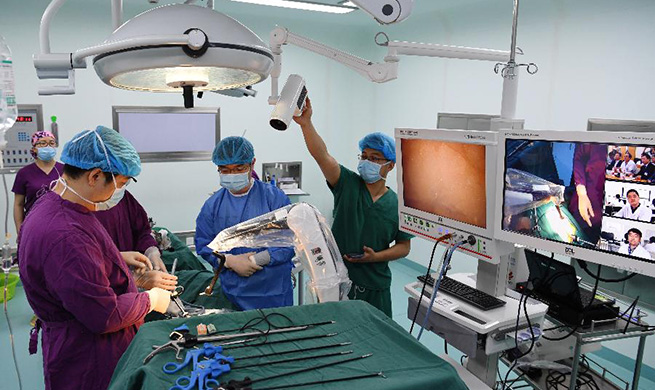by Chen Jin and Lin Huifen
BUCHAREST, May 25 (Xinhua) -- Romania is to hold elections for the European Parliament on Sunday, and 13 political parties and three independent candidates will compete for the 32+1 seats of the eastern European country in the 751-seat EU chamber.
Over 18 million voters nationwide will vote in more than 18,000 polling stations, while overseas voters can make their choices at some 440 polling stations in many countries.
The elections are not only a competition for the European seats by the various political forces of Romania, but also a new demonstration of their strength after the national elections at the end of 2016. It is also a a prelude of the presidential elections at the end of the current year.
In the national parliamentary elections some two and a half years ago, the Social Democratic Party won more than twice as many votes as its main rival, the National Liberal Party. However, since the Social Democratic Party-led ruling coalition took office, the party has been plagued by internal and external troubles.
On the one hand, the party is constantly attacked by the center-right camp headed by President Klaus Iohannis; while on the other hand, the cohesiveness of the biggest ruling party had been decreasing because of intensified intra-party struggle that and the party leader Liviu Dragnea had replaced two prime ministers and initiated several other government restructurings.
Meanwhile, the main opposition party was also deeply confused by the lack of a strong leader and the practical claims that might made the electorate's hearts beat. Therefore, they did not grow up quickly because of the main ruling party's decline.
Local analysts believe that in this European Parliament Elections, the Social Democrats will certainly not be able to replicate the glory of the general elections in 2016, while the National Liberals' votes are not expected to increase very much. The votes lost by the Social Democrats may probably be obtained by other small parties.
A survey released by the CURS, one of the two poll agencies accredited by The Central Electoral Bureau for exit polls, revealed early May that the Social Democratic Party is expected to get 32 percent of the votes, followed by the National Liberal Party with 25 percent.
The third went to the Save Romania Union PLUS 2020 Alliance, which has 12 percent of the votes. Other parties that may get European parliamentary seats are the Alliance of Liberals and Democrats with 10 percent, the Pro Romania Party with 9 percent, the People's Movement Party and the Hungarian Democratic Union of Romania, both with 5 percent.
Romania, currently the rotating presidency of the European Union (EU), has almost been shrouded in criticism from some older members of EU since joining the Union 12 years ago, and its request to join the Schengen zone has been delayed, resulting in growing dissatisfaction in the country.
Leaders of the two parties in the ruling coalition openly accused the EU of adopting double standards in dealing with Romania. Undoubtedly, the "multi-speed Europe" scenario within the EU has also sparked strong opposition from this country.
Romania ranks seventh in the number of seats in the European Parliament, and will one more seat after Brexit, with its ranking rising to the sixth.
This election can also be regarded as a statement by the Romanian voters on the EU, according to local analysts.
How will the over 30 European parliamentarians elected by them act in the new European parliament, whether Romania will become a "disobedient" country like Hungary or Poland, these will all affect the continued expansion or contraction of the East-West rift in the EU, being also a test of the pro-European forces in the new European camp.
On the day of the election, Romania will also hold a referendum proposed by President Iohannis and the voters are called to say "Yes" or "No" on questions related to anti-corruption and justice.
EU member states hold European Parliament Elections this week, with the Netherlands and the United Kingdom taking the lead on Thursday, while voters in most other countries will vote on Sunday.
The preliminary election results of the 28 EU member states will be announced late Sunday, at 23:00 Brussels time.













